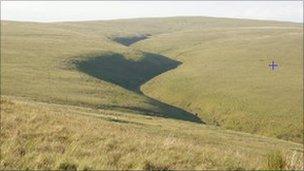RWE npower win legal bid over Mynydd y Gwair wind farm
- Published

The proposed wind farm at Mynydd y Gwair near Felindre would be the tallest in Wales
An energy company has won its legal bid against a Welsh Government decision to block plans to build Wales' tallest onshore wind farm.
RWE npower hoped to build 19 turbines up to 127 metres high on common land at Mynydd y Gwair, Felindre, near Swansea.
Swansea Council rejected permission for the project and was backed by a planning inspector.
But a judge has now ruled the firm's original appeal against the decision should be reconsidered.
On Friday Mr Justice Beatson concluded a judicial review by saying the then environment minister had accepted the recommendations of a planning inspector to reject the appeal on the grounds of its impact on an important habitat of peat bog.
The judge ruled that the original reasoning was deficient.
However, he also rejected a separate claim from RWE npower Renewables over proposed changes to common land in the area.
Swansea councillors rejected the Mynydd y Gwair scheme in January 2010 on the grounds that the turbines were 27m higher than guidelines for the area.
Mynydd y Gwair was identified as a suitable location for a large-scale wind farm due to its strong and persistent winds.
The company estimates it would generate enough clean electricity each year to supply the average needs of about 28,000 homes.
At that time Swansea council's planning committee said its visual and landscape impact was unacceptable and the proposed route for construction traffic was inadequately justified.
But the council had taken more than a year to reach this decision and in October 2009 RWE started the appeals process on the basis the decision was taking too long.
The Welsh Government rejected the appeal in February this year and the firm then decided to seek a judicial review.
An RWE npower renewables spokesman welcome the decision as an "important step" in the development of the wind farm at Mynydd y Gwair.
"This legal challenge focused on the inspector's decision making and conclusions. The conclusions did not follow logically from the evidence presented at the inquiry and the information recorded by the inspector.
"This outcome now questions the minister's decision to reject planning permission, based on recommendations from the inspector's report."
The Welsh Government has been asked to comment.
- Published6 August 2010
- Published6 August 2010